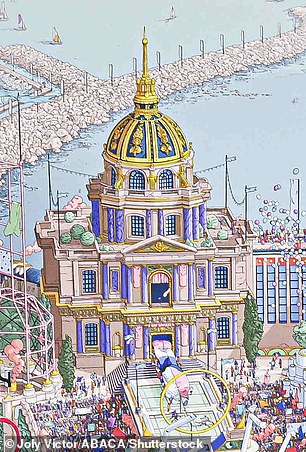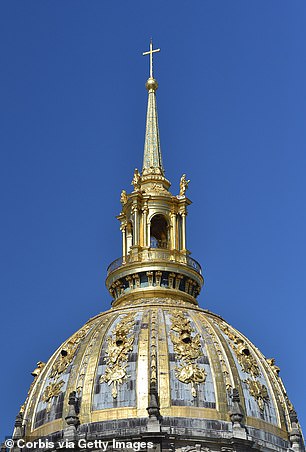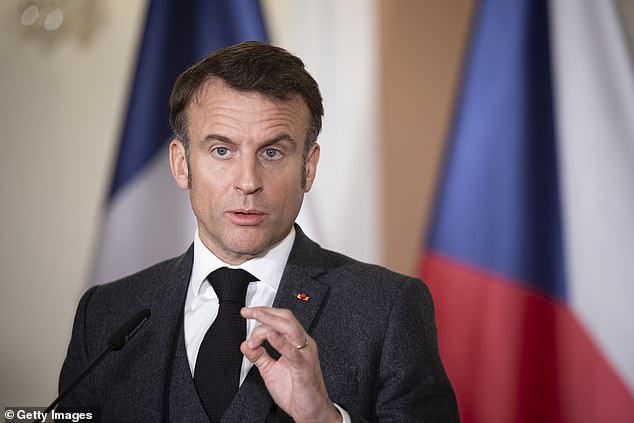The Paris Olympics poster has removed a Christian cross from Napoleon’s tomb, sparking fury among critics.
Two art-deco posters from the city were revealed this week to promote the event, displayed on billboards in the capital.
But right-wing critics have spoken out against the “woke” designs for omitting a cross from the Domes des Invalides.
It comes amid anger over possible government plans to build what has been called a Saudi “Olympic village” on the grounds of Les Invalides.
Both conservatives and liberals have expressed their anger after one of Emmanuel Macron’s ministers confirmed that Paris was treating Riyadh’s request to establish a national pavilion in the center of the military complex with “sympathy.”
The site houses army and Legion of Honor museums, as well as the hospital for wounded soldiers. State memorial ceremonies and funerals are held in the courtyard.
The Paris Olympic Games will be held from July 26 to August 11, followed by the Paralympic Games from August 28 to September 8.
The pavilion will take its place in May for a total of four months under plans revealed after Conservative MP Nathalie Serre demanded details in a parliamentary question.
Yesterday, French artist Ugo Gattoni’s promotional posters for the Olympic Games were unveiled, showing the Eiffel Tower, Les Invalides and the Grand Palace.



Yesterday, French artist Ugo Gattoni’s promotional posters for the Olympic Games were unveiled, showing the Eiffel Tower, Les Invalides and the Grand Palace. In the photo on the right: The Dome Church of the Invalides
François-Xavier Bellamy of the right-wing Republican party, pointing out that the cross was missing from the building where Napoleon’s tomb is kept, angrily said that those responsible for the image were “willing to deny France, even going so far as to distort reality to nullify it.” “. is history’.
“What’s the point of holding the Olympic Games in France if we then hide who we are?” Marion Marechal, from the far-right party Reconquete (Reconquista), published in X.
National Rally legislator Nicolas Meizonnet wrote that the omissions must be the result of “wokism,” a specter of the French far-right.
Reacting to being dragged into France’s culture wars, Gattoni said he had rendered the buildings “the way they come to mind, without any ulterior motive.”
“I do not intend for them to be faithful to the originals, but rather to make them recognizable at a glance, placing them within a surreal and festive universe,” he said in a statement sent by the organizing committee.
The committee said the posters were a “joyful interpretation of a reinvented city-stadium”, adding that there was no obligation to include the French flag.
A surf wave is seen ‘offshore of the Marseille marina; the Eiffel Tower is pink; “The Metro passes through the Arc de Triomphe, something that should not be the subject of interpretations for political reasons,” he said.
The colors of the French flag (blue, white and red) are present on the mascots’ rosettes, and other national symbols such as Marianne are also visible.
Speaking about the proposal for the Saudi “Olympic village”, Serre said that a foreign state would not be in tune with “an architectural treasure, full of symbolism and the history of our country.”
He added: “There are some things that are not for sale and, in my opinion, Les Invalides is one of them.”
Defense Minister Sébastien Lecornu said the government had a “comprehensive view” on the proposal, noting that “Saudi Arabia is committed to respecting the financial and security measures of Les Invalides” and calling Riyadh “an important partner.” defense”.
He said several nations would build pavilions in the city.
The Defense Ministry noted that the agreement depended “on strict conditions that the Saudis have not yet accepted, which must guarantee the security and solemnity of the place and the peace of the resident pensioners.”


Both conservatives and liberals have shown their anger after one of Emmanuel Macron’s ministers confirmed that Paris was trying, at Riyadh’s request, to establish a national pavilion in the center of the military complex “with sympathy” (File photo)
With every decision scrutinized and discussed on social media, organizers have already faced criticism for their choices regarding Games aesthetics and merchandise in the past.
Last year, critics pounced on the fact that the official Paris 2024 mascots were mostly made in China, while others suggested the cute red triangles resembled a clitoris.
The official logo, which features a flame, was compared to the one used by Marine Le Pen’s far-right National Rally party when it was launched in 2019.
On Tuesday, Interior Minister Gerald Darmanin announced that a total of 326,000 tickets will be sold or given away for the opening ceremony on the Seine River, giving the exact figure for the first time.
Organizers have scaled back their plans for the open-air parade on the water, with crowds once envisioned as high as two million, amid resistance from French security services and concerns about terrorist attacks.
But it is still expected to break records in terms of size, as all previous Olympic opening ceremonies have taken place in the main athletics stadium.
“We will have 104,000 spectators on the lower bench who have paid a ticket,” Darmanin said at a Senate hearing. “Then we have 222,000 people in the upper banks (with free notes).”
He estimated that about 200,000 more people would watch the parade on July 26 along the river from buildings overlooking the Seine, and 50,000 more in fanzones in the capital.
The boat parade is in line with promises to make the Paris Olympics “iconic”, with the organizing committee keen to break with past traditions in the way it stages the world’s biggest sporting event.

